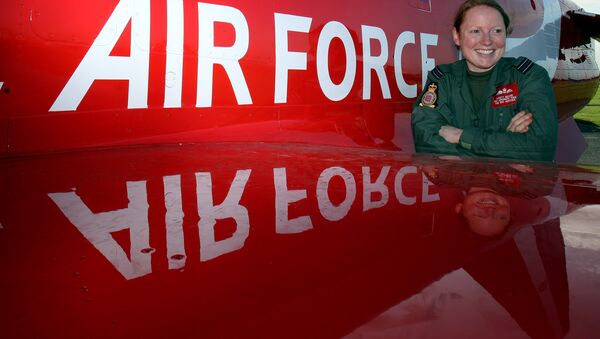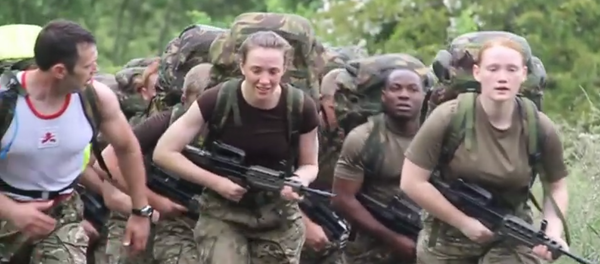Founded in 1942, the RAF Regiment is charged with protecting RAF bases, aircraft and equipment at home and abroad. All constituent troops are trained in CBRN (chemical, biological, radiological and nuclear) defense, and equipped with advanced vehicles and detection measures.
The RAF Regiment will open close combat roles to women ahead of schedule, the Defence Secretary has announced today https://t.co/lS5xIhgSw4 pic.twitter.com/crVgpHMAiE
— Ministry of Defence (@DefenceHQ) July 13, 2017
For the entirety of its existence — even during World War Two, a conflict that catapulted women to the frontline forevermore — its ranks have been exclusively male, by decree.
In 2002, a UK government report on women in the Armed Forces noted the principal areas of the military from which women are excluded are those that require to deliberately be "close with and kill the enemy face-to-face." The list of precluded divisions includes the Royal Marines General Service, Household Cavalry and Royal Armoured Corps, Infantry and the Royal Air Force Regiment.
"All operate in small teams of which the basic component is often the four person fire team, which may have to face the enemy at close range. This environment poses extraordinary demands on the individuals, and success or failure — and survival — depend upon the cohesion of the team in extreme circumstances for which there are no direct comparators in civilian or even Service life," the report said.
The report added that when considering whether to change this policy, account was taken of the experience of other countries — noting in the 20th century only the Soviet Union (in World War Two) and Israel had used women in close combat roles. Moreover, while some countries permitted women to apply to serve in such roles, they had not tested them in combat.
However, this longstanding ban was lifted in July 2016, by then-Prime Minister David Cameron — ever since, female soldiers have been allowed to apply for roles in the cavalry, infantry and armored corps. The changes have been introduced in phases, starting with the Royal Armoured Corps in November 2016, before being completed by 2018 to include the infantry and Royal Marines. The RAF regiment was due to open its recruitment at the same time, but plans have evidently been accelerated.
By opening RAF Reg to women @RoyalAirForce becomes first Armed Forces service to have zero blocks on women in any role
— David Willetts (@DavidWilletts3) July 13, 2017
Making the announcement, Fallon said a diverse force would be a "more operationally effective" force.
"I'm delighted the RAF Regiment will be open to recruitment to women. Individuals who are capable of meeting the standards for the regiment will be given the opportunity to serve, regardless of their gender. This is a defining moment for the RAF, as it becomes the first service to have every trade and branch open to both genders," the minister explained.
Still, the UK government is committed to attracting more women to the Armed Forces, and is offering flexible working patterns to fit in with family life. The Queen's Speech included proposals for a bill that would include part-time service and special arrangements to ensure individuals are not deployed too far away from home, and personnel returning from maternity, parental or adoption leave are offered more options to support an easier transition back into duty.
The government's push for military equality has, however, attracted accusations of pandering to political correctness. When the policy was announced by Cameron, former Colonel Richard Kemp said allowing female soldiers to fight on the front line would be a "foolish move" that would be "paid for in blood" — and likened the move to "social engineering experiment."
In response, General Sir Nicholas Carter, the professional head of the Army, was adamant standards would not slip, and women would be properly supported if and when they took on combat roles for the first time. In any event — over 80 percent of jobs across the Armed Forces are open to women already.
"If you're an infantryman now, you're just as likely to have your minefield cleared and to be escorted through that minefield by a woman, and you're just as likely to have your radio operated by a woman. I don't see that this is anything more than a natural evolution," he said.
Nonetheless, concerns about the entrance of women into front line capacities may have some foundation. The physical demands placed upon such personnel are necessarily high, and any reduction in standards would pose significant risks to the operational effectiveness of forces – something any military would wish to avoid at all costs.
Differences in the physical abilities of average men and women relevant to military performance inarguably differ significantly – sweeping divergence in male/female capacity to develop muscle strength and aerobic fitness, for instance, means only around one percent of women can equal the performance of the average man.
This means that in lifting, carrying and similar tasks – performed routinely by the British Army – women would likely have to have a lower work capacity than men and, when exposed to the same physical workload as men, have to work 50-80 percent harder to achieve the same results, placing them at high risk of injury or even death. Previous research suggests fewer than five percent of the 7,000 women in its ranks would pass the current infantry fitness test.



